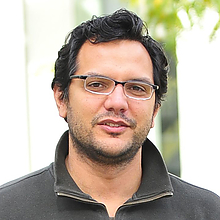Héctor Corrada Bravo

Héctor Corrada Bravo is a visiting research scientist in UMIACS.
His research focuses on statistical and machine learning methods for high-throughput genomic data analysis. This includes pre-processing of measurements from high-throughput assays, disease risk models that integrate high-throughput genomic and other data, and cancer epigenetics and biomarker discovery. Corrada Bravo's research interests also include the development of new methods and tools from multiple areas in the computational and statistical sciences: basic bioinformatics/biostatistics, statistical and machine learning, data management, and numerical optimization.
He received his doctorate in computer science from the University of Wisconsin in 2008. Corrada Bravo held a post-doctoral fellowship in biostatistics in the Johns Hopkins Bloomberg School of Public Health from 2008 to 2010. He joined the University of Maryland in 2010.
Go here to view Corrada Bravo‘s academic publications on Google Scholar.
Publications
2010
2010. Intensity normalization improves color calling in SOLiD sequencing. Nat MethNat Meth. 7(5):336-337.
2009
2009. Model-based quality assessment and base-calling for second-generation sequencing data. Johns Hopkins University, Dept. of Biostatistics Working Papers. :184-184.
2009. A phylogenetic mixture model for the evolution of gene expression. Molecular biology and evolution. 26(10):2363-2363.
2008
2007
2007. Optimizing mpf queries. Proceedings of the 2007 ACM SIGMOD international conference on Management of data - SIGMOD '07. :701-701.
2005
2005. A framework for set-oriented computation in inductive logic programming and its application in generalizing inverse entailment. Inductive Logic Programming. :69-86.
